In this article:
A steaming bowl of oatmeal is likely to be present at the breakfast table every now and then. In addition to being easy to prepare, oatmeal is nutritionally dense and can help foster your health in many ways.
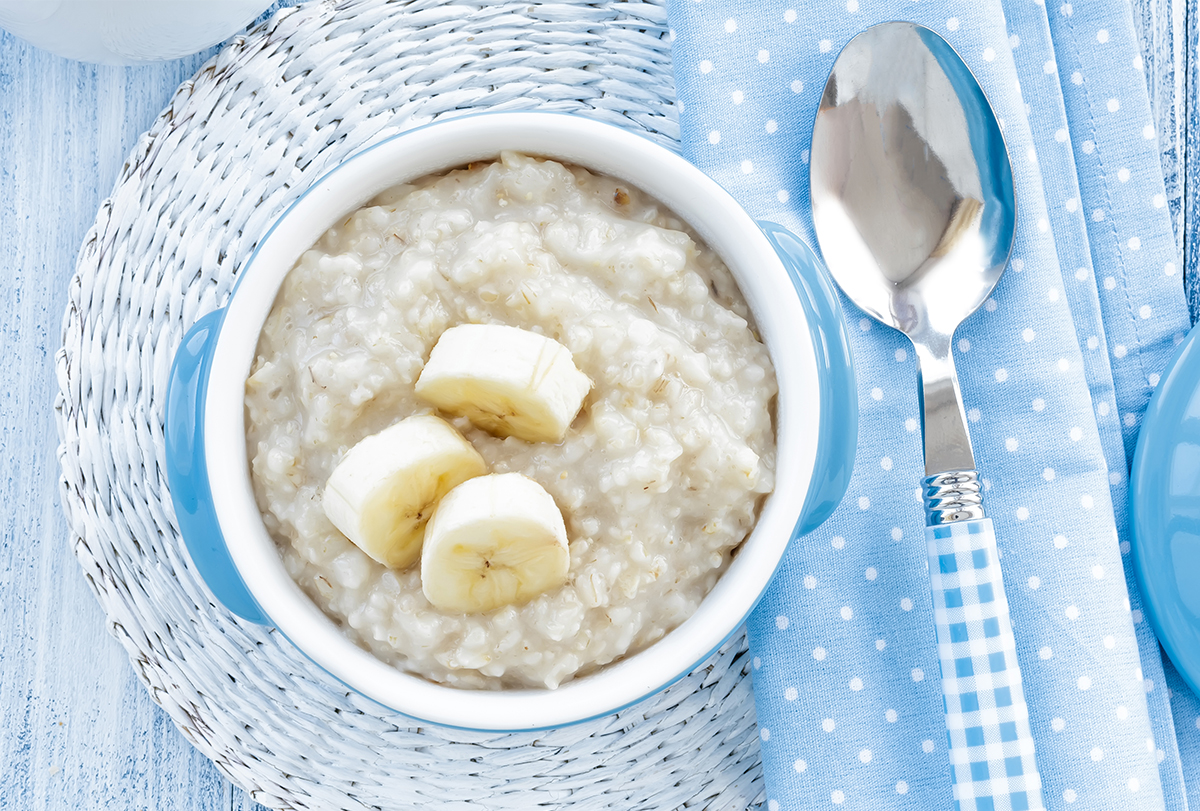
Scientifically known as Avena sativa, oats are the seeds of the grass and are edible as a cereal. Oats have been known to humans since the Bronze Age.
In comparison with wheat and barley, oats have a lower summer heat requirement and greater rain tolerance, so they are best cultivated in the cool and moist temperate regions of Europe and North America.
Their notable presence as an agricultural crop has been marked in the 18th and 19th centuries, particularly documented by historians at various occasions in the culture of Scotland. Being economical, easy to cultivate, and feasible to process, people started using oats as cereals.
A 2019 study was conducted on children to assess their diet quality and nutrient intake from different breakfast options. The study, published in Nutrients, concluded that oatmeal may be a healthy breakfast option for children. (1)
Nutritional Facts of Oatmeal
Oatmeal is replete with energy and nutrition. A cup of pure oatmeal contains protein, carbohydrates, and fiber for approximately 166 calories. (2)
Aside from the macronutrients, oatmeal also contains folate, omega-3 fatty acids, B vitamins, and a considerable amount of minerals, including zinc, potassium, selenium, magnesium, and iron.
A single serving of oatmeal offers a whopping 25% of the daily iron requirement for men and about 11% of the daily requirement for women.
All of these minerals are used in vital bodily functions. For example, iron is part of hemoglobin in the blood that carries oxygen to each and every cell of the body, magnesium works concomitantly with calcium to strengthen the bones, and zinc is involved in the sensory responses of taste and smell.
The nutritional prowess of oats is the reason behind its superior status in the list of healthy foods.
Nutritional value of oatmeal per 100 gms: (3)
| Nutrient | Unit | Amount |
|---|---|---|
| Water | g | 8.22 |
| Energy | kcal | 389 |
| Protein | g | 16.89 |
| Total lipid (fat) | g | 6.9 |
| Carbohydrate, by difference | g | 66.27 |
| Fiber, total dietary | g | 10.6 |
| Calcium, Ca | mg | 54 |
| Iron, Fe | mg | 4.72 |
| Magnesium, Mg | mg | 177 |
| Phosphorus, P | mg | 523 |
| Potassium, K | mg | 429 |
| Sodium, Na | mg | 2 |
| Zinc, Zn | mg | 3.97 |
| Thiamin | mg | 0.763 |
| Riboflavin | mg | 0.139 |
| Niacin | mg | 0.961 |
| Vitamin B-6 | mg | 0.119 |
| Folate, DFE | µg | 56 |
| Fatty acids, total saturated | g | 1.217 |
| Fatty acids, total monounsaturated | g | 2.178 |
| Fatty acids, total polyunsaturated | g | 2.535 |
Health Benefits of Oatmeal
Here are some of the benefits of oatmeal on human health:
1. Lowers cholesterol
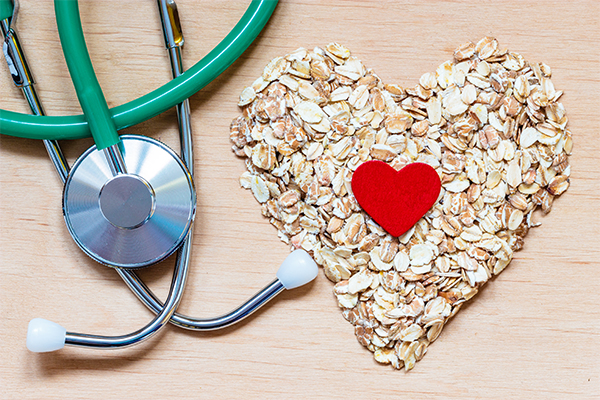
The fiber present in oatmeal has lipid-lowering benefits. The beta-glucan soluble fiber lowers LDL (“bad” cholesterol) levels and decreases intestinal absorption of cholesterol.
The US Food and Drug Administration recommends a daily intake of 3 g of beta-glucan to lower LDL cholesterol. Just ½ cup of old-fashioned oats contains about 2 g of this soluble fiber. (4)
In addition, oatmeal contains an antioxidant called avenanthramide that protects against LDL oxidation. The antioxidant function improves when combined with vitamin C. So, to enhance the cholesterol-lowering effects, combine your oatmeal with a vitamin C-rich food such as an orange.
2. Reduces cardiovascular risk
A leading cause of heart attacks is atherosclerosis. Oatmeal is rich in antioxidants that fight free radicals and reduce oxidative stress and inflammation. Through these means, oatmeal reduces CVD risk.
A study published in Nutrition stated that consuming instant oatmeal daily for 6 weeks can bring a significant increase in your fiber intake, thus reducing the factors associated with the risk of cardiovascular diseases in adults. (5)
Also, the lignans present in oats help prevent heart disease, and the beta-glucans promote heart health and have been found to improve ischemic heart injury. Oatmeal also offers significant cardiovascular benefits to postmenopausal women.
3. Aids in weight loss
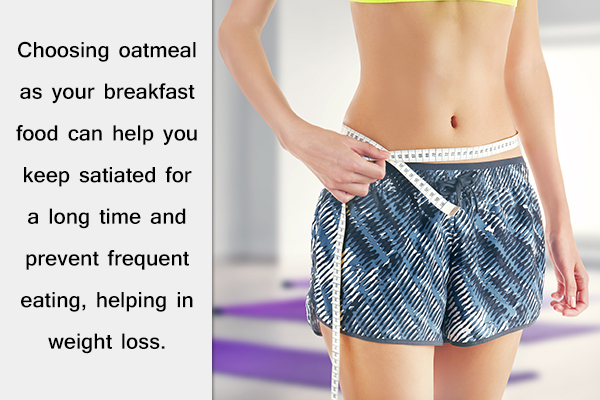
An oatmeal breakfast is great for those striving to lose those extra pounds and maintain a healthy body weight. Being rich in protein and fiber, it makes you feel fuller and satiated.
A study published in 2012 in Nutrition Journal indicated that oatmeal is a more filling fiber option than other cereals. Thus, choosing oatmeal as your breakfast food can help you keep satiated for a long time and prevent frequent eating, helping in weight loss. (5)
Researchers have also compared the effects of unflavored instant oatmeal and oat-based cold cereals and found that the former is better at keeping you fuller and reducing your subsequent energy intake.
They reported that the processing of the soluble fiber beta-glucan in manufacturing cold cereals renders it less effective. These findings were presented at Journal of the American College of Nutrition 2013. (6)
Higher levels of beta-glucan are associated with a higher level of peptides, which are appetite-control hormones.
4. Stabilizes blood sugar
Oatmeal contains high-quality complex carbohydrates that provide a steady source of energy compared with other breakfast options. Being high in fiber, oats are digested by the body slowly, hence preventing a spike in blood glucose levels.
A study in 2015 published in Nutrients highlighted the effects of oat consumption on the glycemic control and lipid profiles of individuals suffering from type 2 diabetes. Oatmeal can be recommended as a safe option for these patients. (7)
However, the efficacy of oat intake in patients with type 1 diabetes needs further research and studies.
Note: Always check the label before making a purchase. Choose organic and unprocessed oats over the commercially available ready-to-eat variety.
5. Lowers high blood pressure

A 2015 study published in the Journal of Food Science and Technology showed that regular consumption of oat cereal helps reduce systolic and diastolic blood pressure in people with mild or borderline hypertension. (8)
Oat bran and whole oats are particularly useful in controlling high blood pressure. Plus, the fiber and magnesium in oatmeal slow the formation of plaque and help increase blood flow.
A daily serving of whole oats and adding more whole-grain products to your diet will help control high blood pressure and reduce your risk for heart attacks.
6. Supports intestinal health
The high fiber content of oatmeal has significant benefits for your colon and intestinal health. It is good for people suffering from ulcerative colitis and can reduce the risk of developing colon cancer. Oatmeal also contributes to a healthy bowel function and helps relieve constipation.
According to a 2014 study published in the British Journal of Nutrition, whole-grain foods can be used as an alternative by patients suffering from celiac disease. (9) It was found out that patients could consume up to 100 g/day of pure oats, which could by large help them adhere to a diet free from gluten.
Note: When adding fiber to your diet, make sure to drink plenty of water to help the fiber do its job.
7. Soothes the skin
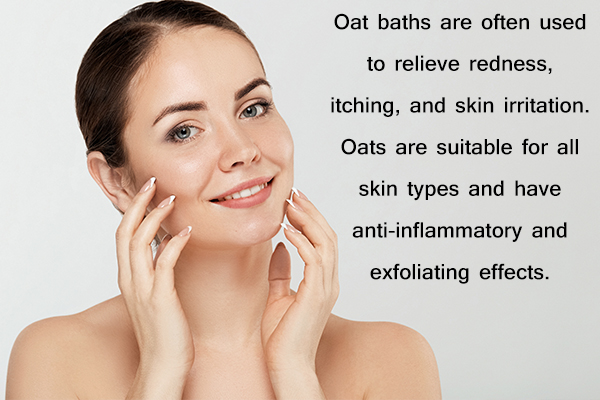
Aside from eating oatmeal, you can also use oats externally to soften and moisturize your skin. Oat baths are often used to relieve redness, itching, and skin irritation. Oats are suitable for all skin types and have anti-inflammatory and exfoliating effects.
A 2015 study published in the Journal of Drugs in Dermatology corroborated that oats in a colloidal state can contribute to skin protection by fighting the oxidation and inflammation that are responsible for various dermatological problems. (10)
The presence of saponins in oatmeal makes it a natural cleanser and helps remove excess oil, dirt, and impurities from the skin. Moreover, some oat phenols work as strong ultraviolet absorbers to protect the skin from sun damage.
- Use oats in your home-made scrubs and face packs to cleanse your skin.
- Add pure oatmeal to your bath water to relieve any itching and irritation in your skin.
ALSO READ: 10 Healthy Foods to Eat for Beautiful and Flawless Skin
8. Produces satiety and stress relief
Oats can control your hunger pangs by keeping you full for a long time.
A 2016 study published in Nutrition Review indicated that oatmeal houses magnesium that plays a role in improving the quality of sleep. (11)
Magnesium can help keep your mind and body relaxed. It was also suggested that eating oatmeal can keep your hunger at bay, by signaling the brain to produce the neurotransmitter serotonin, which is known to influence appetite, mood, and sleep.
Even a small serving of this complex-carbohydrate food can help relieve stress. To enhance the health and mood benefits of this guilt-free comfort food, add blueberries to your bowl of oatmeal. Blueberries are considered one of the best stress-busting foods due to their high antioxidant and vitamin C content.
9. Boosts immunity
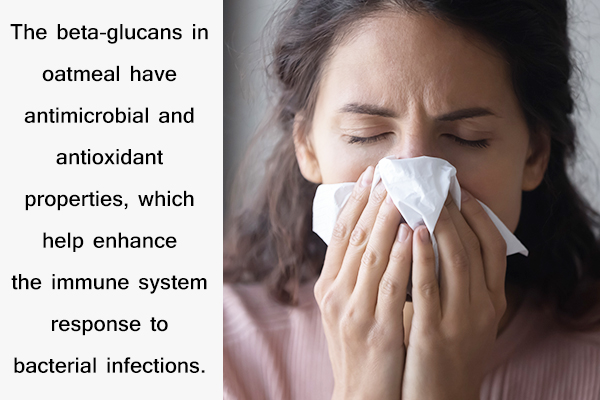
Whole-grain oats are rich in immune-boosting nutrients. They are a good source of dietary fiber, which is linked to changes in immune cell activity.
Moreover, the beta-glucans in oatmeal have antimicrobial and antioxidant properties. A study in 2011 published in Immune Network suggested that beta-glucans help enhance the immune system response to bacterial infections. (12)
To derive the immune-boosting benefits of oatmeal, opt for steel-cut or old-fashioned rolled oats instead of the instant oatmeal varieties that are often loaded with sugars.
10. May help with breast cancer
Oatmeal is rich in phytochemicals such as lignans and enterolactone that may help protect from cancers. Enterolactone, in particular, has been found to be effective in preventing breast and other hormone-related cancers.
In addition, the soluble fiber in oats, rye, and other similar foods has a direct impact on breast cancer cells. A 2015 study published in the Journal of Food Science and Technology showed that the high amount of short-chain fatty acids in oats may possess potent anticancer activity. (8)
Choosing the Right Oatmeal for You
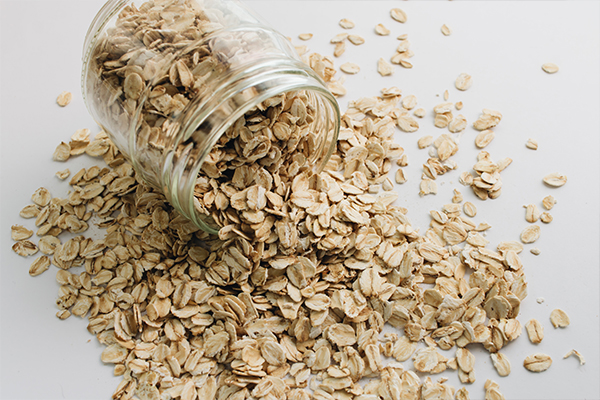
Oatmeal is available from a number of sources and in a number of forms. Because oatmeal is bursting with a whole lot of nutrition, it is necessary to select the healthiest available option to fully reap its benefits.
Oatmeal is prepared by processing the oats, utilizing methods that can either preserve or deplete their nutrition and health benefits.
Different varieties of oatmeal are available for purchase in the grocery aisle of the supermarket. There are chiefly three common types, which are differentiated on the basis of processing:
- Instant oats: A ready-to-eat option loaded with sweeteners, additives, and preservatives. Although a convenient option for breakfast, the various additions pull down the nutritional quality of the oats.
- Steel-cut oats: As the name suggests, these oats were prepared by cutting whole oat grains with a sharp blade. These oats are not very fine, and the texture is chewy and grainy, so their cooking requires time.
- Rolled oats: Also known as old-fashioned oats, these are oat groats that were steamed and rolled into flakes. They are midway between the steel-cut and instant varieties when it comes to processing. The cooking time is comparatively less than that of the steel-cut varieties. The rolling is done in a way to make sure that the nutritional content is retained.
Always scan the product labels carefully before purchasing your oatmeal. Also, make sure it is:
- Packed in an airtight container or package
- Not soggy or damp
- Fresh smelling if contained in a bin
- Free from any dirt or debris
- Free from any traces of additives such as salt, sugar, and flavoring
Preferred Oatmeal Preparations
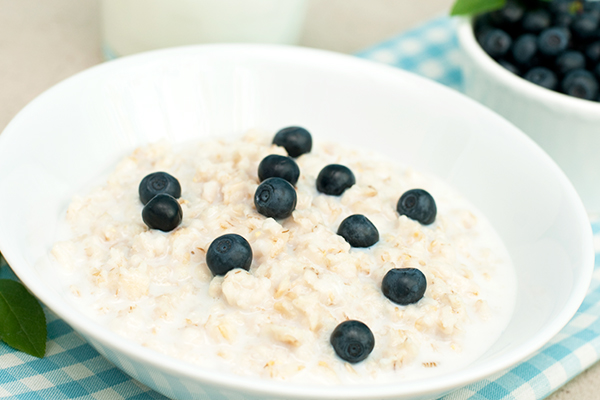
Oatmeal is a versatile breakfast alternative that can be consumed as either a sweet or a savory dish. Refrain from using instant oats if you wish to obtain the most benefits from oats.
Prepare your oatmeal the standard way or spice up your recipes with nutrient-dense ingredients. You can also prepare your oatmeal in the following ways:
- Add your chosen oatmeal to a cup of milk and yogurt and top it with a drizzle of honey and your favorite fruits.
- Use oatmeal as an alternative to refined all-purpose flour when baking cookies, cakes, bread, pancakes, and muffins. For this purpose, blend the oats to a fine powder.
- Use oat bread for your sandwiches and toasts.
- Replace the rice in your risotto with either rolled or steel-cut oats.
Steps to prepare oatmeal:
- Roast your oats in oil with the onions.
- Add water, at regular intervals.
- Keep stirring the mixture after adding the other ingredients of the dish.
- Let it sit on the flame until cooked.
Steps to prepare oats pudding:
Prepare an oats pudding for breakfast and treat your sweet tooth in a healthy way.
- In a glass jar, add about ½ cup of rolled oats, ½ to 1 cup of milk of your choice (vegan or dairy), ½ cup of mixed fruits of your choice, 1–2 tablespoons of chia seeds, a few nuts, and a pinch of cinnamon powder.
- As an option, you can add dried fruits or a few tablespoons of Greek yogurt to perk up the flavor and nutrition.
- Tightly screw the lid of the jar and shake it vigorously until the ingredients are mixed well.
- Keep the jar in the fridge for at least 4 hours. This will soften the oats and give them a pudding-like texture and consistency.
Precautionary Measures
It is important to stay informed of the risks associated with any food item. This will help to prevent untoward events. Although oats are accredited with plenty of benefits, caution is warranted in some instances when eating oatmeal.
- Avoid eating oats if you don’t have a good chewing habit. In some cases, not chewing properly can result in the clumping of the oats, which can cause blockage in the intestines.
- Individuals with gastrointestinal discomforts and problems in the stomach, esophagus, and intestines must not eat oats. These conditions include reflux, bloating, chronic diseases such as inflammatory bowel syndrome and Crohn’s disease, and other inflammatory disorders of the stomach and intestine. The lectins and phytic acids in oats can act as an irritant and lead to flare-ups of these diseases.
- Oats themselves are gluten-free. However, the processing plant may be producing cereals that contain gluten, exposing the oats to gluten contamination. People with gluten sensitivity must check if the oats they are consuming are pure and free from cross-contamination to avoid any allergic reaction.
Why Are Instant Oats Not a Healthy Choice?
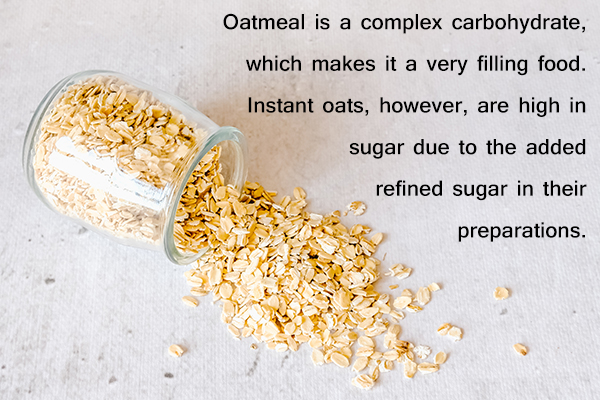
Oatmeal is a complex carbohydrate, which makes it a very filling food. Instant oats, however, are high in sugar due to the added refined sugar in their preparations.
A 40–50 g serving of instant oatmeal contains about 35 g of carbohydrates, out of which around 10–12 g is refined sugar. By topping your instant oatmeal with a drizzle of honey and sugary fruits, you are likely to spike your sugar levels to about 30 g in a single meal.
Simple and complex carbohydrates break down into sugar (glucose) and the glucose is absorbed into the bloodstream. This causes blood glucose levels to rise. The glucose rise stimulates the release of insulin.
Insulin then signals for the transport of the glucose to the cells to be used for energy. Once the energy needs are met, the remaining glucose is converted to fat and stored.
The high glycemic index (GI) of 79 assigned to instant oatmeal is a testament to its unhealthy nature. The GI is the value assigned to foods indicating how quickly they raise the blood sugar levels. High numbers indicate that the food quickly increases blood sugar levels after eating.
Instead of instant oats, rolled or steel-cut oats are a wiser option. You can add a punch of flavor to your preparation by adding yogurt or fruits.
Final Word
Oats offer an array of nutrients, including carbohydrates, soluble fibers, phytochemicals, vitamins, and minerals, to name a few. The positive attributes of oatmeal extend beyond nutrition.
Oatmeal can be used to lower cholesterol and promote digestion. Externally, it can be used to calm itching and irritation caused by inflammation.
Keep in mind that the instant preparations of oats store a bevy of additives, refined sugar, and preservatives, which can plummet the nutritional quality of the oats when compared with their organic and bland counterpart.
The secret to a healthy oatmeal preparation is the use of pure oats that have been minimally processed with no added sugar or preservatives of any kind.
- Was this article helpful?
- YES, THANKS!NOT REALLY


